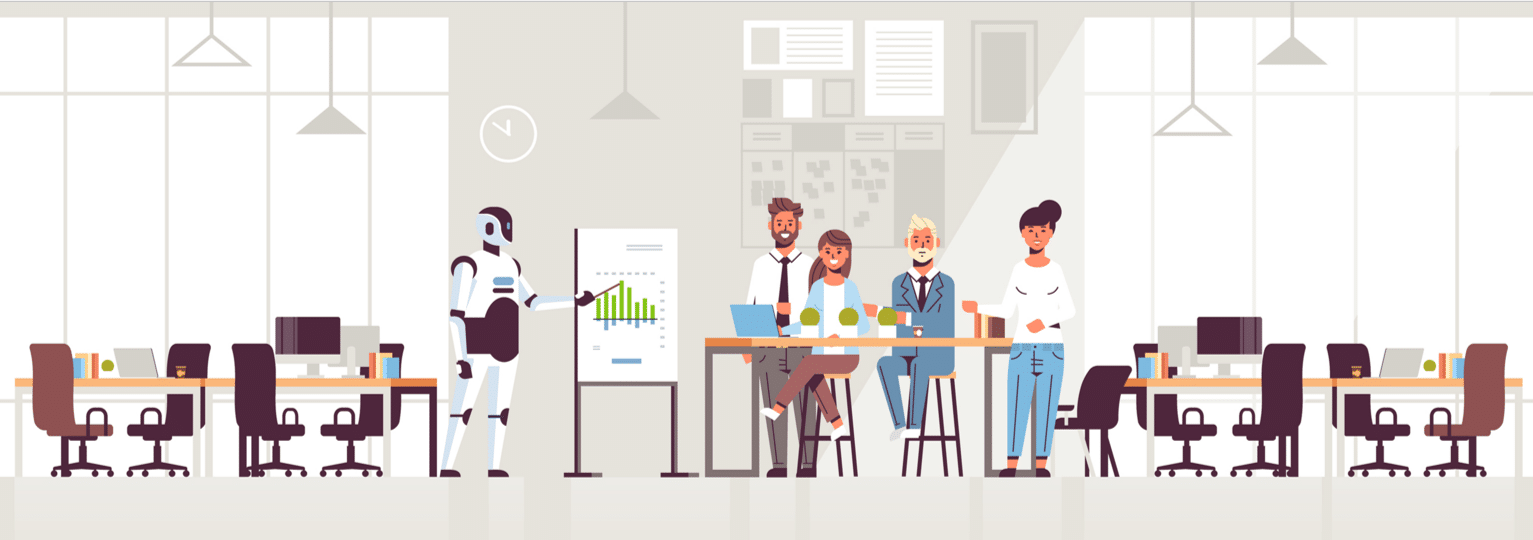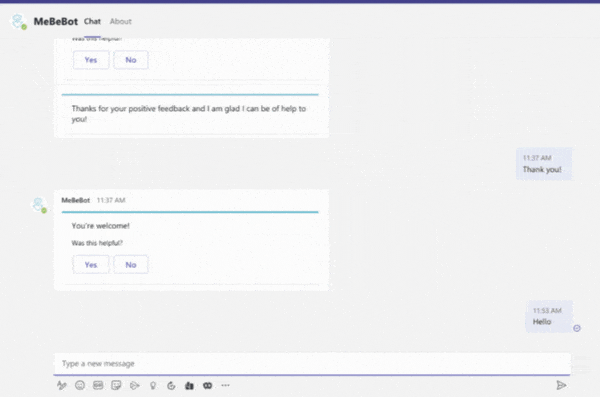With the advent of the 4th Industrial Revolution, we are living in a new era of technological changes that impact not only the way we live as individuals (and consumers), but also the way we work. The term “Super Teams” has been used to describe the combination of people and intelligent machines, like chatbots, to solve problems, improve productivity, and bring AI and automation into daily tasks within the workplace.
As companies acquire new talent and work to retain their existing workforce, there is a heightened expectation that organizations will use AI and automation to improve business efficiencies to scale and grow.
Upskilling employees is key to success in shifting work processes from manual tasks to learning new tools and solutions that leverage AI technologies. Two-thirds of the businesses surveyed by McKinsey and Company, said they plan to increase their investment in AI. This includes McKinsey and Company, which is hiring employees with AI skills — and is also upskilling employees in their current workforce to understand how AI works and with new AI skills. Their talent management process will reassign them to emerging AI roles at the company.
McKinsey has a Technology and Digital function that works to innovate tools and processes to ensure “The Firm” brings the best to its clients. McKinsey developed a plan to upskill more than 500 colleagues in different roles for AI/machine learning techniques and their applications. The roles included leaders, business sponsors, product managers, user experience professionals, engineers, data experts, and support professionals.
Through this program, McKinsey saw that successful upskilling happened quickest for people already in relevant product development roles: technology product managers up-skilled to AI product managers; software developers to machine-learning engineers; or data architects to data engineers. They aligned individuals with relevant ongoing projects to have hands-on experience and paired them with AI-capable experts they could shadow and learn from their expertise.

McKinsey proudly reports that “these are employees that are upskilled for life, who have grown and developed in a way that will sustain them in their careers for the long term.”
That doesn’t sound like people are losing their jobs to chatbots or AI but moving to new careers with skills of the future. But still, the concern over job loss continues.
In February 2021, the McKinsey Global Institute predicted that 49 million Americans would lose their jobs to automation by 2030. This is one-quarter of the US workforce. This 2021 prediction is up from McKinsey Global Institute’s 2017 prediction of 39 million jobs. But when you look closely at the numbers, according to Slate, the robots aren’t coming. However, automation will continue but with a lesser impact on job loss. As you will learn, most of those disrupted by automation will move to new roles after upskilling.
Slate’s authors point out that there is a stark difference between robots and automation. Once, many elevators were operated by people. They weren’t replaced by humanoid robots that listen to rider requests and manipulate a lever with mechanical fingers. They were replaced by a row of buttons riders press themselves. A lot of automation works this way. Over the past 150 years, the US has gone from a nation of farmers to manufacturing to white collar and services jobs -with automation driving the change. Still, America has a labor shortage because it is hard to replace white-collar and service jobs with robots or even automation.
Back to McKinsey’s 2021 report. While it predicts that 49.1 million will have their jobs displaced by automation, 32 million will stay in the same occupation, and another 2.2 million will remain in the same occupational category. The number of people who will lose their jobs in the “have to find a new line of work” sense is only 14.9 million. Not 27 percent, but 9 percent. That’s because automation is more likely to change jobs than destroy them. Machines will perform an increasing share of boring, rote tasks, and people will move to more human work.
Unlike McKinsey, most companies do not have employees with strong skills in AI and automation and the skills gap is much larger to fill. How do you teach employees with basic understandings of internal tools and solutions they use for their day-to-day jobs to grow into being comfortable with AI and chatbot assistants? MeBeBot‘s Intelligent Assistant (AI chatbot) has become the employees’ best friend, answering their questions accurately and quickly. It has also become a valuable internal resource for the IT, operations, and human resources professionals that can depend on MeBeBot to answer employee questions quickly and accurately. By trusting in the “machine,” they can focus their attention on the strategic issues that enable company growth. We love hearing from our customers how MeBeBot has enriched their jobs and has taught them new skills in AI.
Just like other AI solutions that leverage Natural Language Processing (NLP) and Machine Learning (ML) components, like Siri and Alexa, the more you use it, the more accurate it becomes. Many organizations use machine learning (ML), but MeBeBot does more to train the chatbot to provide accurate results. MeBeBot has created an AI data model, that is trained by “crowdsourcing” all the questions that all customers’ employees are asking, so that the AI chatbot is already well trained to produce the desired results.
This technology is critical for our 90 percent accuracy rate in answering questions. It is also essential for identifying new employee issues that are emerging from our clients’ employees by question category, business unit, or region of the world. As mentioned earlier, not only do chatbots alleviate these professionals from the time-consuming tasks of answering repetitious questions, MeBeBot is a partner to these professionals — alerting them of new issues, such as internal system outages and challenges employees may have with new benefits or programs.
Using MeBeBot’s Customer Portal, business users (in HR, IT and Ops) learn valuable skills in understanding how NLP works to determine the best answer for the employee. They learn how to apply ML to train the AI for a greater degree of accuracy and how the ML improves over time with human supervision.
Employees that are given the opportunity to upskill and learn AI tools will gain greater job satisfaction and confidence in their future roles within the organizations for career development. This drives employee retention and strengthens the overall company’s ability to compete in attracting new talent as well.
MeBeBot’s Intelligent Assistant seamlessly installs as an app in Teams, Slack, or web portals to provide employees with instant automated answers to global HR, IT, and Ops FAQS, real-time usage Dashboards, Push Messaging, and custom Pulse Surveys, generating instant employee feedback on of-the-moment questions. MeBeBot’s “one-stop bot” is trusted by leading organizations to elevate the employee experience so work can be more meaningful and valuable.
Visit our website at https://mebebot.com

